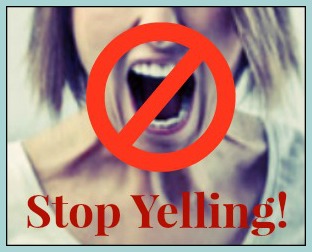How to Stop Yelling at the Kids
Sheila Wray Gregoire, blogger at To Love, Honor and Vacuum, writes and speaks to strengthen marriages. She addresses marriage and intimacy issues, parenting and homeschooling. When I read her great ideas for moms who “lose it” with their kids,* I knew she’d be perfect for an Upgrade Your Parenting post.
“Question 1: Do you yell at your kids because you’re too busy?” Sheila asks.
Thinking back on my parenting years, I nod my head. Uh, huh—too busy. And Sheila addresses some  other common reasons.
other common reasons.
She continues …
Most of the time I yell it’s because I’m aggravated. And the reason I’m aggravated is because: (1) I have plans, and things to get done, and (2) other people aren’t getting with the program.
We yell because we think the real issue is #2. But what if it’s actually #1?
In many scenarios, the children are behaving perfectly normally. The problem is not that the children won’t get with the program; it’s that you have made decisions which make it virtually impossible for the children to cooperate.
It’s that what you’re asking them (and what you’re asking of yourself) may very well be unreasonable.
Take a look at the last three times you really yelled at your kids. What was going on? Were you in a hurry? What was your schedule like? Is there something YOU can do differently to prevent getting annoyed with everyone and everything?
Question 2: Do you yell at your kids because you’re afraid of something?
Anger is often a secondary emotion. We often feel anger because it’s “safer” to feel than some of the other emotions—insecurity, fear, guilt. So when someone pushes a button that triggers a “scary” emotion, we often react in anger, sometimes without realizing what the real trigger is.
The next time you find yourself yelling, ask yourself: what am I really feeling here? Am I scared of something? Am I feeling guilty about something? Pray about that feeling instead.
Question 3: Are you taking time to talk to your kids?
It seems as if you can never get any time alone, away from constant demands!
Here’s the truth: kids like to “check in” and know that they’re secure and safe. They know that when they have your undivided attention. If you can give your child some undivided attention throughout the day, even if it’s just in short spurts, they’re far more likely to let you have some of your own alone time later. Before you start something where you need the kids to leave you alone, take some one-on-one (or one-on-two) time with them. Make it a habit of giving your kids some attention before you need them to leave you in peace.
Question 4: Are you setting consequences for bad behavior, and letting the consequences do the work?
Yelling is not a punishment, yet when we’re mad, often the first thing we do is yell. Kids often learn to drown it out. You yell; you vent some steam; but nothing really changes.
It’s better to have consequences for bad behavior that are immediate, known, and obvious. When you start following through with consequences, kids usually start listening to you—and listening to the warning, better.
Question 5: Are you using a serious voice?
Have you ever noticed how little kids especially are more inclined to listen when dad says something? Dads have deeper, and thus scarier, voices. We moms have this sing-song voice. You’re likely using the same voice that you use for everyday conversation.
If you have something you really want your children to do, use a lower voice and fewer words. In a deep voice. Change your tone and issue a command; don’t make a statement. Let kids know you mean business, and it may not escalate. Kids need to know the difference between you talking to them and you asking them to do something.
Question 6: Are you letting God help you?
I want to reassure you that God wants to help. He doesn’t want you yelling at your precious children, since they are also His precious children. He says in Ephesians 4:29,
“Do not let any unwholesome talk come out of your mouths, but only what is helpful for building others up according to their needs, that it may benefit those who listen.”
He also says we can do all things through Christ who strengthens us. So when you feel weak, ask Him to help you be a great mother to these kids. Even this struggle can help bring you closer to God, and through that He can open the window onto some other things in your heart, and can help heal you and your whole family.
Which of the six questions do you need to work on? Do you have other suggestions to stop the yelling?
* NOTE: Adapted from Sheila’s complete post on this topic, including scenarios for each point. Visit her blog post at To Love, Honor and Vacuum.
 Sheila Wray Gregoire is a syndicated colunist, blogger and speaker. The author of seven books, including How Big Is Your Umbrella and To Love, Honor
Sheila Wray Gregoire is a syndicated colunist, blogger and speaker. The author of seven books, including How Big Is Your Umbrella and To Love, Honor  and Vacuum, Sheila mixes humor and real-life stories to help women deal with the messy problems many of us face. She holds two Master's degrees from Queen's University, but says her real education has come as a wife to Keith and mother to Rebecca and Katie, who they homeschool and take on mission trips. Though Sheila is married to a physician, she still faints at the sign of blood! For more about Sheila, visit her website.
and Vacuum, Sheila mixes humor and real-life stories to help women deal with the messy problems many of us face. She holds two Master's degrees from Queen's University, but says her real education has come as a wife to Keith and mother to Rebecca and Katie, who they homeschool and take on mission trips. Though Sheila is married to a physician, she still faints at the sign of blood! For more about Sheila, visit her website.
 Post a Comment → Posted on
Post a Comment → Posted on  Tuesday, March 18, 2014 at 7:00AM
Tuesday, March 18, 2014 at 7:00AM  Child-rearing,
Child-rearing,  Mothering,
Mothering,  Parenting,
Parenting,  Patience,
Patience,  Sheila Wray Gregoire,
Sheila Wray Gregoire,  Upgrade with Dawn,
Upgrade with Dawn,  Yelling at the Kids Upgrade Your Life
Yelling at the Kids Upgrade Your Life  Attitudes,
Attitudes,  Parenting
Parenting 



